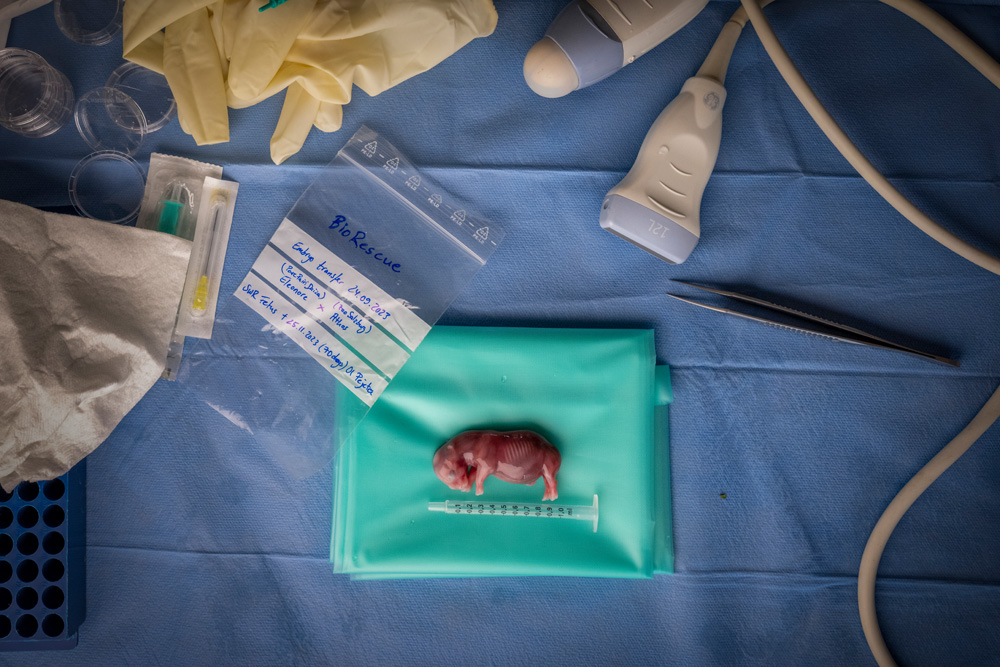Spanish freelance photographer and filmmaker Jon A Juárez, affiliated with the Leibniz Institute for Zoo and Wildlife Research (Leibniz-IZW) in Berlin, has been awarded one of the world’s most prestigious distinctions in nature photography: the “Wildlife Photographer of the Year 2025 Award” (WPY) in the Category “photojournalism” at the Natural History Museum, London. His winning photo documents the world’s first successfully embryo transfer in southern white rhinos (Ceratotherium simum simum) — a scientific milestone offering renewed hope for saving its critically endangered northern relative (Ceratotherium simum cottoni).
The photographic assignment in Kenya, which covered the documentation of the worldwide first rhino foetus produced by in vitro fertilization and successful embryo transfer, was coordinated by the German Conservation and Research Fund e.V. (CRF) — a non-profit organisation supporting, amongst other things, visual documentation that bridges science, ethics, and wildlife conservation.
The bittersweet winning image: where science meets aesthetics
Jon A Juárez’s award-winning photograph was taken during a BioRescue pregnancy evaluation and shows an early-stage rhino foetus. The image captures the fragile intersection between biotechnology and life itself. “This photograph is more than scientific documentation — it’s a symbol of humanity’s capacity to take responsibility for species on the brink,” says Prof Dr Thomas B. Hildebrandt, BioRescue consortium leader from Leibniz-IZW.
“I wanted to tell the story of this foetus in a single image — one that would portray it with respect, while revealing its fragile, translucent skin that would soon fade away,” says award-winner Jon A Juárez.
Saving the northern white rhino from extinction
The BioRescue consortium has already produced 38 northern white rhino embryos. Before these can be transferred to surrogate mothers, it first had to be proven that embryo transfer could be successful in this species. The southern white rhino embryo was produced in vitro from collected egg cells and sperm and transferred into a southern white rhino surrogate mother at the Ol Pejeta Conservancy in Kenya on September 24, 2023. The BioRescue team confirmed a pregnancy of 70 days with a well-developed 6.4 cm long male embryo. The successful embryo transfer and pregnancy are a proof of concept and allow to safely move to the transfer of northern white rhino embryos – a cornerstone in the mission to save the northern white rhino from extinction.
Sadly, the pregnancy ended tragically when both the surrogate female rhino, Curra, and the vasectomised teaser bull, Ouwan, died in late November 2023 at the Ol Pejeta Conservancy. Exceptionally heavy rains had flooded the enclosure, releasing dormant Clostridium spores into the environment. Both animals succumbed to acute systemic infection and toxin-related poisoning caused by the bacteria. Tissue samples from the foetus were later analysed at the Max Delbrück Center and the Leibniz-IZW in Berlin, confirming the pregnancy’s scientific origin.
The Leibniz-IZW is a leading partner in the international BioRescue consortium, whose mission is to prevent the extinction of the northern white rhinoceros through advanced assisted-reproduction technologies and stem cell associated techniques and – after profound ethical assessment – eventually gene editing. BioRescue is primarily funded by the German Federal Ministry of Research, Technology and Space (BMFTR), formerly known as the BMBF. A proposal to secure the continued support of the BMFTR was submitted in the summer of 2025.


